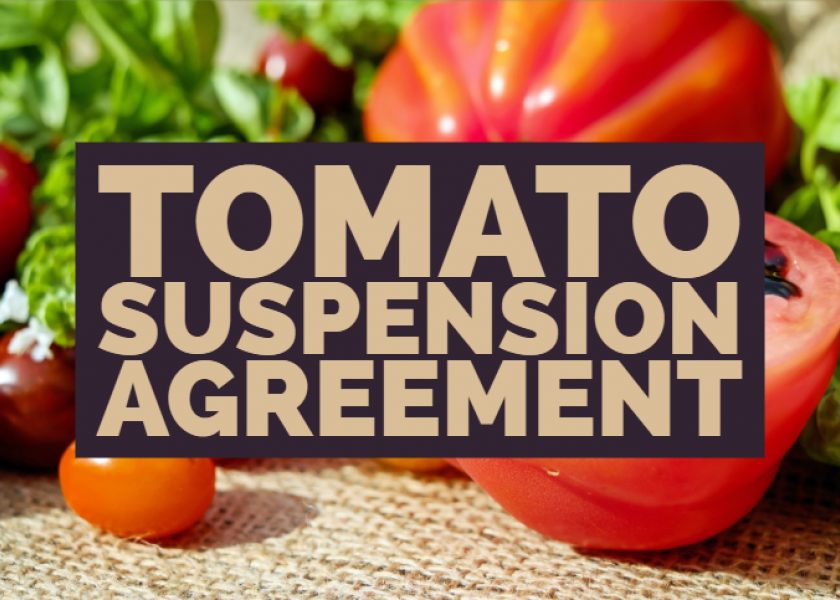Trade commission says Mexican tomatoes threaten U.S. growers

In a decision that will keep in place the tomato suspension agreement between Mexican growers and the Department of Commerce, the U.S. International Trade Commission ruled that Mexican tomatoes sold at less than “fair value” threaten the domestic industry.
The ITC on Nov. 22 determined with a vote of 4-0 that the U.S. tomato industry is threatened by imports of fresh tomatoes from Mexico, agreeing with the Commerce Department that they are sold in the U.S. at less than fair value, according to a news release from the commission.
As a result of the trade commission’s decision, the suspension agreement Commerce signed with Mexican tomato growers remains in effect.
International Trade Commissioners Rhonda Schmidtlein, Jason Kearns, Randolph Stayin, and Amy Karpel sided with the U.S. tomato industry; chairman David Johanson did not vote, according to the release.
An ITC report, Fresh Tomatoes from Mexico (Inv. No. 731-TA-747 (Final), USITC Publication 5003, December 2019) will contain the views of the Commission and information developed during the investigation, according to the release. It will be available to the public by the end of the year at https://bit.ly/2rlOmXr.
Vindication
The Florida Tomato Exchange said the unanimous ruling came soon after the Department of Commerce’s decision that Mexican tomatoes had been dumped in the U.S. market at an average margin of 21% less than fair value.
“These rulings validate the U.S. industry’s long-held claims about dumped Mexican tomatoes,” according to a news release from the tomato exchange.
A similar ITC decision in an anti-dumping investigation typically leads to duties, but because the investigation was completed after the signing of a new suspension agreement, the anti-dumping duties will be suspended for as long as the agreement remains in place. If the agreement is abandoned, however, anti-dumping duties begin immediately, according to the Florida group’s release.
“The Florida Tomato Exchange hopes that this new reality will instill discipline among exporters and importers of Mexican tomatoes so that they will not attempt to circumvent the rules of the suspension agreement,” according to the release.
The Florida Tomato Exchange said the U.S. industry looks forward to “turning the page” after two years of negotiations and investigations.
“The new agreement provides a level of certainty that has that has been lacking over the last couple of years on both sides of the border, and we hope all parties can now focus on complying with the terms of the new agreement,” Michael Schadler, executive vice president of the Florida Tomato Exchange, said in the release. “We will remain very engaged with the Commerce Department to ensure that the inspection and compliance provisions of the new agreement are being followed and enforced properly.”
Disappointment
In a news release after the decision, Mexican tomato growers expressed disappointment in the ITC ruling and have separately challenged the Commerce Department finding of dumping at the U.S. Court of International Trade.
“Our calculations based on the very computer programs used by the Commerce Department demonstrate that we are not dumping. We look forward to having the court review Commerce’s calculations,” Rosario Beltran, president of the Sinaloa growers association, said in the release.
The release said Mexican growers remain committed to the terms of the agreement signed in September. Extensive implementation efforts across Mexico began months ago and will intensify as the industry ramps up for the winter season.
“The grower associations in Mexico are working closely with their membership to make sure all the terms of the agreement are understood and there is full compliance,” Guillermo Jimenez, president of Mexico’s AMHPAC growers association, which represents protected-agriculture growers, said in the release. “We have done bulletins, workshops and webcasts to reach every grower.”
Antonio Gandara, president of the Sonora growers association, said in the release that Mexican tomato growers “take the Department of Commerce at its word that the agreement is not designed to impede trade and will be an enduring document.”
The Nogales, Ariz.-based Fresh Produce Association of the Americas said in a news release that the trade commission “failed to recognize that the growth of Mexican tomato imports is due to U.S. consumer preferences and U.S. companies seeking out the best varieties and growing regions to meet these demands.”
“Companies across North America have been importing tomatoes from Mexico for over a century. U.S. importers have worked with their North American customers to create a category of tomatoes highlighted by superior quality, flavor and consistency of supply. Today’s ruling will not change this,” Lance Jungmeyer, president of the FPAA, said in the release. “Consumers prefer vine-ripened tomatoes, and this is why domestic gassed-green tomatoes continue to lose market share. We are disappointed that the USITC failed to recognize this simple reality.”
The FPAA continues to work with members to comply with the tomato suspension agreement, according to the release.
Related stories:
Commerce sets preliminary dumping margin of 25% on Mexican tomatoes
Tomato leaders spar before the International Trade Commission







